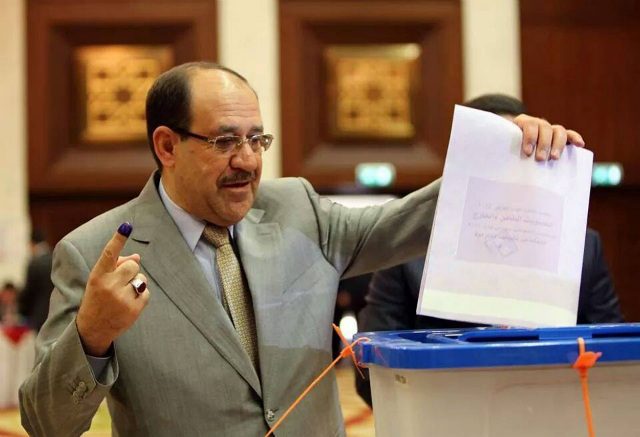SUMMARY
This is AI generated summarization, which may have errors. For context, always refer to the full article.

BAGHDAD, Iraq (UPDATED) – Iraq’s premier said Thursday, May 1, he had enough support to keep his post, but with election results not due for weeks and parties bitterly divided, forming a government will probably take months.
Nuri al-Maliki, who is seeking a third term in office, will have to court disaffected parties within his own Shiite community, as well as Sunnis and Kurds who have angrily voiced opposition to his rule, but he expressed confidence following the polls on Wednesday, April 30.
His remarks to journalists came as new figures showed April was among the bloodiest months since Iraq was embroiled in a brutal Sunni-Shiite sectarian war that left tens of thousands dead in 2006 and 2007.
The protracted surge in bloodshed, with more than 3,000 people killed already this year, is among the long list of complaints, along with rampant corruption, high unemployment, and what critics of the government say is insufficient improvement in public services.
Preliminary results from Wednesday’s election are not expected for at least two weeks. Initial figures from the election commission said around 60% of 20 million eligible voters had voted.
Turnout in the last election in 2010 was 62%.
No government soon?
As was the case after previous elections, forming a government is likely to take months, but Maliki said on Thursday that he had the votes to put together a ruling coalition.
“We have confidence that we will achieve a political majority,” he told reporters in Baghdad’s heavily fortified Green Zone.
“We have an ability to pass the 165 (seat threshold)” required to form a majority government.
However, he insisted he would not cling to the post: “My mother did not give birth to me as a minister or a prime minister…I am not interested in this subject (of being premier).” (READ: PM ‘certain’ of victory as Iraqis vote despite attacks)
While Maliki’s bloc is tipped to win the most seats, no single party is expected to win a majority on its own and Iraq’s various political alliances and communal groups will have to form coalitions.
Complicating matters is the fact that the three main positions of power – the president, typically a Kurd, the prime minister, normally a Shiite, and the speaker of parliament, usually a Sunni Arab – are often negotiated as an encompassing package.
“Finding a balance between the three communities – Sunnis, Shiites and Kurds – is not that easy of a process,” said Ayham Kamel, Middle East and North Africa Director for Eurasia Group.
Kamel predicted forming a government could take three to six months, noting: “It’s a bit difficult to do all of these things at once.”
Wednesday’s election, the first since US troops withdrew in late 2011, came amid a protracted surge in bloodshed, with new government figures released Thursday showing more than 1,000 Iraqis killed last month alone.
Figures compiled by the United Nations and Agence France-Presse also illustrated the continued spike in unrest.
On election day alone 14 people were killed, including two election workers.
Rebuke to extremists
But a security clampdown meant violence levels were lower than in the preceding two days when nearly 90 people died, with Washington and the United Nations hailing the vote as a rebuke to extremists trying to derail the political process.
Despite the myriad issues facing Iraqis, candidates largely appealed to voters on ethnic, communal or tribal grounds, and the campaign itself hinged on Maliki’s bid for a third term.
The premier’s critics have accused him of concentrating power and marginalizing the Sunni minority, and say public services have not sufficiently improved during his eight-year rule.
Maliki contends that the conflict in neighboring Syria is fueling violence and has accused Sunni Saudi Arabia and Qatar of backing insurgents. (READ: Mortars, sound grenades target Iraq voters, no victims)
Analysts had expressed fears many voters would stay home rather than risk being targeted by militants. But many Iraqis said they had voted despite the unrest because they were tired of their elected officials.
“I hope to change all the current politicians, especially members of parliament, because they are thieves and are looting the country’s money,” said 91-year-old Jawad Kamal al-Din, who hobbled to a polling centre in west Baghdad. – Rappler.com
Add a comment
How does this make you feel?
There are no comments yet. Add your comment to start the conversation.